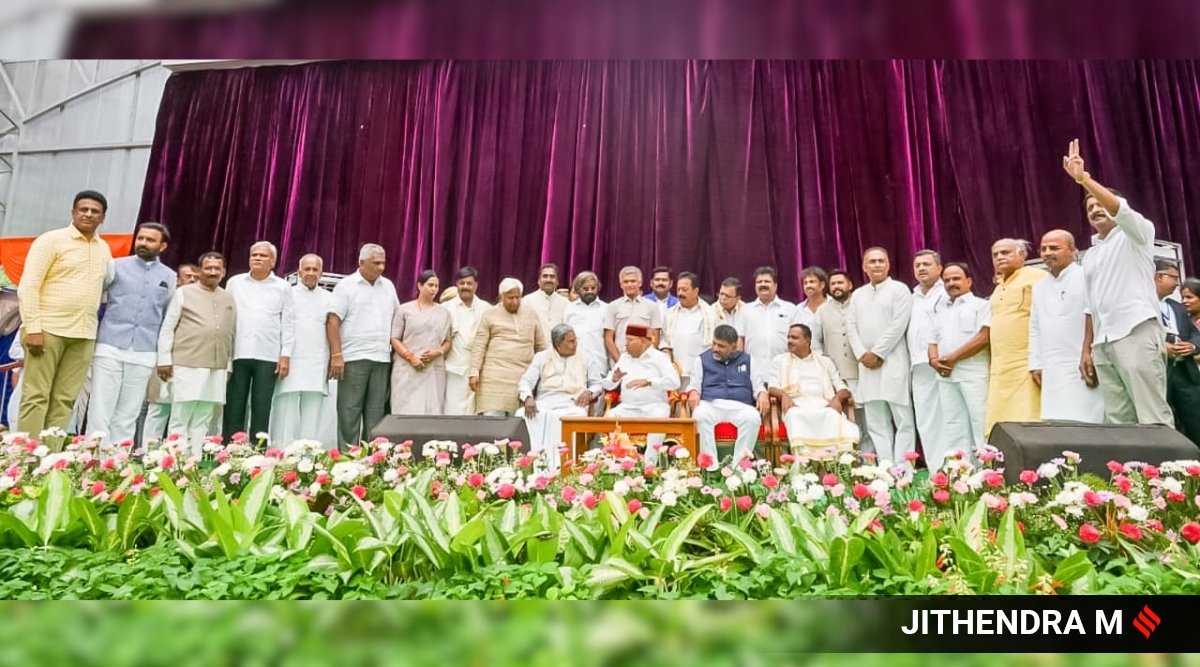Rabindranath Tagore once wrote, “Woman is the builder and moulder of a nation`s destiny….she is the supreme inspiration for man’s onward march”. The destiny of a nation is defined by the progress women have made.
Our nation is currently led by a woman, President Droupadi Murmu. Where, then, are the other women in the Indian political landscape? The newly-elected Karnataka government has showcased all the checkboxes it fills in its cabinet. Be it caste or community, everything has been impeccably placed, for so-called social justice.

But the bigger question is: Where are we, the women of Karnataka? The cabinet has only one woman. The participation of women in politics is about equity and human rights — both of which are the ethos of a vibrant and resilient democratic society.
 Lakshmi Hebbalkar, the lone woman minister in the Siddaramaiah cabinet, takes oath in the name of Basavanna, Chatrapati Shivaji, Dr Ambedkar, her voters and her mother. (Facebook/Lakshmi Hebbalkar)
Lakshmi Hebbalkar, the lone woman minister in the Siddaramaiah cabinet, takes oath in the name of Basavanna, Chatrapati Shivaji, Dr Ambedkar, her voters and her mother. (Facebook/Lakshmi Hebbalkar)
Nari Shakti has been an essential component in our march towards a resurgent India. Positioning women as the architects of development and ensuring their role is no longer limited to being passive recipients of dole-outs is the vision of New India. The present union government has recalibrated economic policies in favour of women — policies that favour women-led development. In contrast, the newly-formed Karnataka government has been indifferent to women’s participation, even in politics. In the last few years, all schemes and provisions under the central government have recognised the progress, and strength of Nari Shakti — ensuring women’s transition from mere beneficiaries to benefactors for society. Pivoting them from being at the centre of election freebies to being at the forefront of civic and social development, has been the Centre’s legacy.
Far from adequate participation of women in politics, their portrayal in social schemes such as ‘Gruha-Lakshmi’ is problematic —- in it, women will be provided with set monetary benefits. Without any Lakshmi in decision-making roles, the formation and implementation of gender-sensitive schemes look rather lacklustre, if not patriarchal.
Congress’s victory in Karnataka was reportedly primarily because of the women voters’ turn-out. Why are they not seen as oath-takers then? The present cabinet doesn’t appear to be giving due respect to the women of the state.
We are long past being custodians of income — we are now income generators. Schemes like Mudra Loans for Women (Mahila Udyami Yojana), Annapurna Scheme, Stree Shakti Yojana, Mahila Samriddhi Yojana, Nai Roshni Yojana (specifically for Women from Minority Communities) and several other sector-specific schemes have not only helped foster entrepreneurship among women but have also helped strengthen the role of women in society. Women are striking a great balance between being great homemakers and enterprising homeowners who give back to society.
Most Read 1Chandrayaan-3 mission: Dawn breaks on Moon, all eyes on lander, rover to wake up 2As Indo-Canadian relations sour, anxiety grips Indian students, residents who wish to settle in Canada 3Karan Johar says Sanjay Leela Bhansali did not call him after Rocky Aur Rani: ‘He’s never called me but…’ 4Gadar 2 box office collection day 40: Hit by Shah Rukh Khan’s Jawan onslaught, Sunny Deol movie ends BO run with Rs 45 lakh earning 5Shubh’s tour in India cancelled: Why is the Canada-based singer facing the music?
Representation is the key to empowerment. From Plato to Babasaheb, every great thinker has continuously emphasised the role of women in social transformation. There should be diversity in leadership — gender equality and the cycle of social justice is incomplete without women being the centripetal force. Increased engagement of women in the public domain and in leadership roles will create a more concerted, action-oriented and inclusive governance model. Politics, in essence, is the practice of power.
Women constitute half the population of India. They should have due representation in politics too. Women bring with them unique insights, enabling a comprehensive understanding of societal needs. Their involvement in politics increases the likelihood of addressing gender-specific issues, promoting equality, and enacting policies benefiting all citizens. It gives me immense pride seeing young girls acing the toughest competitive exam in India. But this land of warrior Sita still yearns for her daughters to share the same place as her sons and fill the void that remains in reclaiming our rightful place on the world’s stage. The mother of democracy anticipates the active involvement of a greater number of young women in the largest democracy, not just as voters or vote banks, but as leaders and thinkers.
Also ReadWill reservation really help Indian women?Pratap Bhanu Mehta writes on new Parliament: India’s age of ambitionValues Kota imparted: Anxiety and building a future on a butchered presentWith G20-IMEC plan, the global order shifts to Eurasia
The writer is assistant professor, Maitreyi College and founder of DAPSA (Dalit Adivasi Professors and Scholars Association)


